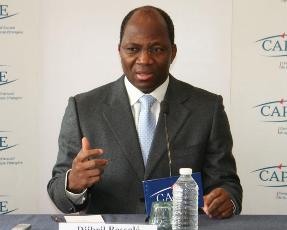Khartoum said committed to negotiate Darfur status in Doha – mediator
March 6, 2011 (DOHA) — Sudanese government has renewed its commitment to negotiate the administrative status of Darfur region with the rebel groups in Doha, the joint chief mediator for the African Union and United Nations, Djibril Bassole, said Sunday.

The presidential adviser entrusted with Darfur file, Ghazi Salah Al-Deen, announced this week that his government would hold a referendum on Darfur administrative status within three months. He explained his position saying it was agreed in the unsuccessful Abuja peace deal of 2006 with the faction of the Sudan Liberation Movement led by Minni Minnawi to hold the plebiscite one year after the general election.
The remarks infuriated the rebel groups who denounced the move saying it transgresses the framework agreements signed with Khartoum and urged the mediation to take a clear stance on this fundamental issue.
In Doha, the head of the Sudanese government negotiating team, Amin Hassan Omer, reaffirmed Khartoum’s commitment to negotiate the status of the Darfur region with the rebel groups in Doha, minimizing the statements of the presidential adviser.
“Amin Hassan Omer told us that the government did not intend to ask the removal of the administrative status of Darfur from the agendas of peace talks,” Djibril Bassole told Sudan Tribune on Sunday.
“We urge the parties to consider the proposals submitted by the mediation to resolve the pending issues in order to achieve progress in the talks,” Bassole further said.
The Government of Sudan (GoS) and rebel Liberation and Equality Movement (LJM) who are negotiating in Doha have failed to reach a compromise on the thorny issue of Darfur administrative status. The situation is eerily similar to the deadlock that led to the failure of Abuja process to finalize an inclusive peace agreement.
Khartoum also seeks to conclude as quick as possible the Doha talks with the rebel groups before to launch the Darfur Political Process (DPP) which will focus on reconciliation and dialogue among social, tribal and political forces in the restive region.
The DPP is not part of the Doha process and posed by the government as valid alternative to the negotiations with rebel groups to achieve stability in Darfur. Ghazi said they are keen to settle the conflict before July, when South Sudan secedes, and urged the mediation in Doha to conclude the process before 15 March.
Sudanese government delegation and the Justice and Equality Movement (JEM) were expected to start talks this week. However, following the sensational statements by the Sudanese presidential adviser, GoS chief mediator Amin Hassan Omer had to leave Doha to Khartoum for consultations.
Ahmed Hussein Adam, JEM spokesperson, reiterated today his accusations to Ghazi Salah Al-Deen saying he intends to undermine the peace talks. The rebel official also alleged that divisions among the members of the Sudanese government after the secession of the South have had a negative impact on the negotiations.
South Sudan voted for independence earlier this year as part of a 2005 peace deal with former Southern rebels the SPLM. The deal, which granted the South the right to self-determination was negotiated, on the Khartoum governments, side, by Sudan’s vice president Ali Osman Taha a leading member of the ruling National Congress Party.
“Ghazi, because he was critical to the concessions made by Taha to the SPLM refuses today any compromise that he may be blamed for by any faction among the National Congress Party”, Ahmed said.
Ahmed added that there is a consensus among all the rebel groups on the status of the region. In a consultation held in Doha as a part of the process, civil society groups also supported the need to create a regional authority.
The former prime minister and leader of the opposition Umma Party Sadiq Al-Mahdi slammed the position of the presidential adviser on the organization of a referendum in Darfur.
In a press conference held in Khartoum on Sunday, Al Mahdi said holding a referendum in Darfur before a comprehensive peace agreement is “mere nonsense”. He went further to propose the reestablishment of the former administrative division where the north Sudan was divided to six regional entities.
“After the signing of a peace agreement, the real alternative is to return to the country’s six provinces, according to a decentralized administration,” he said.
(ST)
